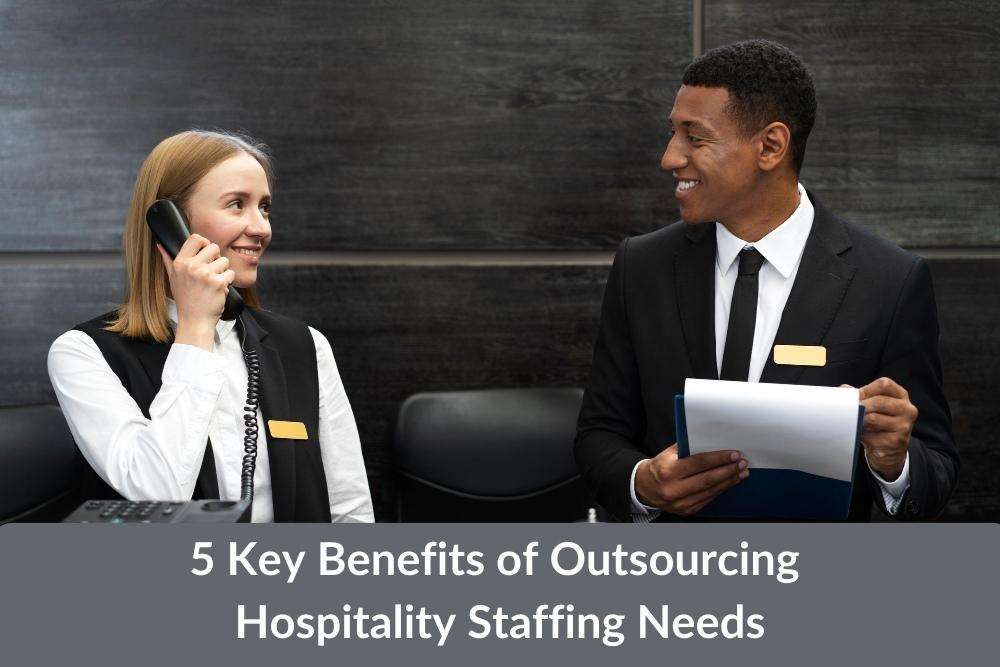Outsourcing Hospitality Staffing has been witnessing a dynamic and transformative shift, spurred by changing consumer preferences, technological advancements, and global economic trends. Amidst the evolving landscape, staffing remains one of the most critical determinants of success for hospitality businesses. The strategic allocation of human resources can significantly impact guest satisfaction, brand reputation, and operational efficiency.
The evolving landscape demands proactive and informed staffing strategies that align with guest expectations, technological advancements, and sustainable practices. By recognizing the importance of effective staffing and leveraging outsourcing opportunities, hospitality businesses can navigate the industry’s complexities and achieve sustained growth and excellence.
Benefit 1: Enhanced Cost Management and Flexibility
A. Reducing Operational Costs and Overhead Expenses
In today’s highly competitive hospitality landscape, efficient cost management is paramount for businesses seeking sustainable growth and profitability. Outsourcing staffing needs provides a strategic avenue for optimizing operational costs and streamlining overhead expenses. It’s essential to delve into the specific ways in which outsourcing contributes to enhanced cost management:
- Cost-Effective Staffing Solutions: Staffing agencies possess extensive networks and expertise in talent acquisition. By leveraging these resources, businesses can access qualified candidates without incurring the significant expenses associated with in-house recruitment efforts. Outsourcing allows hospitality establishments to find the right fit for their staffing requirements without the burden of extensive hiring costs.
- Mitigating Employee-Related Costs: The full scope of employing staff extends beyond salaries. It includes expenses such as benefits, insurance, training, and administrative overhead. Outsourcing staffing needs offloads these employee-related costs to the staffing agency, ensuring predictability and stability in budgeting. Businesses can allocate financial resources more efficiently, redirecting them towards guest-centric initiatives and enhancing service quality.
- Efficiency in Staff Utilization: Seasonal fluctuations and varying demand patterns present challenges in workforce planning. Hiring a full-time, in-house staff to accommodate peak seasons can lead to underutilization during off-peak periods. Outsourcing provides the flexibility to scale the workforce up or down as needed, optimizing labor costs and ensuring an agile response to market dynamics.
B. Adapting to Seasonal Demand Fluctuations
The hospitality industry experiences distinct peaks and troughs due to seasonal variations and special events. Effective staffing solutions that align with these fluctuations are instrumental in maintaining service standards and guest satisfaction.
- Scalability without Disruption: Seasonal demand surges can be challenging to navigate without a flexible workforce. Outsourcing enables businesses to quickly adjust staffing levels during peak seasons, ensuring optimal service delivery without disruptions. This scalability allows for a seamless guest experience while minimizing operational stress for the core team.
- Proactive Workforce Planning: Anticipating peak periods and adequately preparing for increased footfall is vital for hospitality businesses. Staffing agencies have the expertise to proactively plan for seasonal demands, allowing businesses to avoid last-minute recruitment crises and maintain staffing stability throughout the year.
- Reduced Seasonal Overhead: In-house staffing during high seasons often requires temporary contracts, training, and onboarding efforts. Outsourcing circumvents these challenges, as the staffing agency assumes responsibility for temporary staff, freeing up internal resources and reducing seasonal overhead expenses.
Want to know How Temporary Staffing can help your Business? Read it here.
C. Flexibility in Scaling the Workforce as Needed
The hospitality industry’s dynamic nature demands agility in workforce management. Maintaining a balanced staffing level is crucial to uphold service standards while maximizing cost efficiency.
- Real-Time Workforce Adjustments: Hospitality businesses must adapt to unforeseen events, such as sudden guest surges or staffing emergencies. With an outsourced staffing model, the ability to make real-time adjustments to workforce size ensures a swift response to such situations, avoiding service disruptions and maintaining guest satisfaction.
- Tailored Staffing Solutions: Each hospitality establishment has unique requirements based on location, size, and service offerings. Staffing agencies work closely with businesses to understand their specific needs and provide customized solutions that align with the organization’s objectives and brand identity. This tailored approach optimizes workforce management, leading to greater flexibility in scaling staffing as needed.
- Test-and-Learn Approach: For hospitality businesses exploring growth opportunities or introducing new services, outsourcing staffing needs allows for a test-and-learn approach. By engaging temporary or part-time staff for pilot projects, businesses can assess feasibility without making long-term commitments, ensuring strategic decision-making based on real-world results.
Benefit 2: Access to Specialized Talent and Expertise
A. Tapping into a Vast Talent Pool
Access to a diverse and extensive talent pool is critical for businesses seeking to deliver exceptional guest experiences and stay ahead of competitors. Here’s how it provides a distinct advantage:
- Expanding Recruitment Reach: Staffing agencies possess extensive networks that span various regions, industries, and demographics. By partnering with these agencies, hospitality businesses can reach a broader pool of candidates, including those who may not actively seek job opportunities but possess valuable skills and experiences.
- Access to Niche Expertise: The hospitality sector encompasses a wide range of roles and specialties, from culinary arts to event management and guest relations. Staffing agencies specialize in identifying talent with niche expertise, allowing businesses to access professionals skilled in specific areas, enriching the overall service offerings.
- Faster Time-to-Hire: Time is of the essence when it comes to hiring top talent. Outsourcing staffing needs streamlines the recruitment process, enabling hospitality businesses to swiftly identify suitable candidates, conduct interviews, and onboard them. This faster time-to-hire enhances the organization’s agility in adapting to market demands and filling critical roles promptly.
B. Leveraging Industry-Specific Knowledge and Skills
The hospitality industry demands a unique blend of technical knowledge, soft skills, and industry-specific expertise. Outsourcing staffing needs opens the door to a pool of candidates who possess the specific knowledge and skills essential for driving success in this competitive landscape.
- Familiarity with Industry Best Practices: Staffing agencies specializing in hospitality recruitment have in-depth knowledge of industry best practices. They understand the nuances of various roles, such as front-of-house operations, kitchen management, and event planning. This expertise ensures that candidates recommended by the agency align with the organization’s requirements and possess the necessary skills for success.
- Enhanced Guest Experience: The expertise of outsourced staff extends beyond technical abilities. They are well-versed in delivering exceptional guest experiences, understanding the importance of personalized service and attention to detail. Leveraging this expertise elevates the level of service provided to guests, resulting in positive reviews and repeat business.
- Bridging Skill Gaps: In times of expansion or during the introduction of new services, businesses may face skill gaps within their existing workforce. Staffing agencies can bridge these gaps by sourcing candidates with specific skill sets and experiences that complement the core team, fostering a well-rounded and capable workforce.
C. Gaining a Competitive Advantage with Expert Staff
In the fiercely competitive hospitality industry, differentiation is the key to success. The ability to secure expert staff members through outsourcing creates a competitive advantage that sets businesses apart from their rivals.
- Elevated Service Quality: Expert staff members possess the knowledge and finesse required to deliver top-tier service consistently. Their competence enhances the overall guest experience, leaving a lasting impression and building a loyal customer base. As guests share their positive experiences, the business gains a competitive edge and solidifies its position in the market.
- Innovation and Creativity: Expert staff members bring fresh perspectives and innovative ideas to the table. They can infuse creativity into menu designs, event concepts, and guest engagement strategies. This spirit of innovation keeps the business ahead of industry trends and fosters a reputation for being at the forefront of hospitality excellence.
- Training and Mentorship: Staffing agencies often provide training and mentorship opportunities to their recruits. By onboarding expert staff who have benefited from industry-specific training, hospitality businesses gain access to a well-trained workforce that requires minimal onboarding and can be quickly integrated into the team.
Benefit 3: Streamlined Recruitment Processes
A. Saving Time and Effort in Talent Sourcing
In the fast-paced and competitive landscape of the hospitality industry, time is a precious commodity. Outsourcing staffing needs offers a streamlined approach to talent sourcing, leading to several value-added benefits:
- Access to Pre-Vetted Candidates: Staffing agencies employ rigorous screening processes to identify qualified candidates who meet the specific requirements of hospitality businesses. This pre-vetting significantly reduces the time and effort that internal HR teams would otherwise spend sifting through numerous resumes and conducting initial interviews.
- Efficient Job Postings and Candidate Reach: Staffing agencies are adept at crafting compelling job postings that attract high-caliber candidates. Their expertise extends to leveraging multiple channels and networks to reach potential candidates quickly and efficiently. This ensures a broad candidate reach, maximizing the chances of finding the perfect fit for the vacant position.
- Focus on Core Competencies: By outsourcing talent sourcing, internal HR teams can concentrate on their core competencies, such as talent development, employee engagement, and strategic workforce planning. Freed from time-consuming recruitment tasks, they can invest more energy in fostering a positive work environment and nurturing the existing workforce.
B. Leveraging the Expertise of Staffing Agencies
The success of hospitality businesses hinges on the quality of their workforce. Leveraging the expertise of staffing agencies ensures that businesses are presented with top-tier candidates who align with their organizational culture and goals.
- In-Depth Industry Knowledge: Staffing agencies specializing in the hospitality sector possess extensive knowledge of the industry’s specific requirements and trends. This expertise allows them to understand the nuances of various roles, from front-of-house staff to back-of-house support, ensuring that candidates recommended are well-suited for the job.
- Tailored Candidate Selection: Staffing agencies invest time in understanding the unique needs of each hospitality business. This includes the company’s ethos, values, and desired skill sets for potential candidates. With this personalized approach, agencies can match businesses with candidates who not only possess the right qualifications but also align with the organization’s culture and long-term vision.
- Industry Insights and Benchmarking: Staffing agencies have access to comprehensive market insights, including salary benchmarks, industry trends, and competitor analysis. This information empowers hospitality businesses to remain competitive in talent acquisition, offering attractive compensation packages and benefits to secure the best candidates.
C. Efficient Onboarding and Orientation Procedures
Once the right candidates have been identified, the onboarding and orientation process becomes critical in ensuring a seamless transition and successful integration into the organization. Outsourcing staffing needs provides access to efficient onboarding procedures, offering several advantages:
- Swift Onboarding: Staffing agencies prioritize swift onboarding, ensuring that new hires are integrated quickly and efficiently into their roles. This reduces the time to productivity and ensures that businesses can benefit from the expertise of new staff members sooner rather than later.
- Compliant Paperwork and Documentation: Staffing agencies are well-versed in compliance and legal requirements associated with hiring new employees. They handle all necessary paperwork, documentation, and regulatory formalities, ensuring that businesses remain in adherence to labor laws and regulations.
- Tailored Orientation Programs: Recognizing that each hospitality business has its unique practices and procedures, staffing agencies tailor orientation programs to fit the specific needs of the organization. This custom approach equips new hires with the knowledge and resources required to succeed in their roles and fosters a positive onboarding experience.
Benefit 4: Mitigating HR and Legal Risks
A. Ensuring Compliance with Employment Regulations
For hospitality businesses, adherence to employment regulations and labor laws is not only a moral obligation but also a legal imperative. Here’s how this benefit safeguards businesses and adds value:
- Expert Knowledge of Labor Laws: Staffing agencies specialize in employment regulations, staying abreast of updates and changes in labor laws that may impact the hospitality industry. By partnering with these agencies, businesses can rest assured that their staffing practices align with the latest legal requirements, mitigating the risk of penalties and legal disputes.
- Documented Compliance Processes: Staffing agencies maintain comprehensive compliance processes, encompassing everything from employment contracts to workplace safety protocols. This meticulous documentation ensures that all aspects of hiring, employment, and termination follow legal guidelines, offering a layer of protection in the event of audits or legal challenges.
- Reduction of Misclassification Risks: Misclassifying employees as independent contractors or vice versa is a common HR risk. Staffing agencies possess the expertise to accurately classify workers based on their roles and responsibilities, reducing the risk of misclassification and the potential legal ramifications that may arise from such errors.
B. Minimizing Liability for HR-Related Issues
HR-related issues such as workplace disputes, harassment claims, and wrongful termination lawsuits can have far-reaching consequences. Outsourcing staffing needs can minimize liability for such matters, allowing businesses to focus on their core operations and guest experiences.
- Professional HR Handling: Staffing agencies employ experienced HR professionals who are skilled in managing employee relations and resolving workplace conflicts. Their expertise in handling sensitive issues ensures that potential problems are addressed proactively, reducing the risk of disputes escalating into legal actions.
- Objective Employee Evaluations: Evaluating employee performance objectively is crucial for fostering a fair and positive work environment. Staffing agencies provide unbiased assessments of temporary staff, ensuring that business decisions regarding promotions, terminations, or performance improvements are based on merit and not subject to bias.
- Confidentiality and Privacy Compliance: Maintaining employee confidentiality and privacy is paramount in preventing potential legal issues. Staffing agencies uphold strict data protection protocols, safeguarding sensitive employee information and mitigating the risk of data breaches or privacy violations.
C. Professional Handling of Employee Relations
Fostering a positive work environment is instrumental in attracting and retaining talent. Outsourcing staffing needs allows businesses to benefit from the professional handling of employee relations, enhancing overall employee satisfaction and organizational culture.
- Mediation and Conflict Resolution: Staffing agencies excel in mediating employee conflicts and implementing effective conflict resolution strategies. Their expertise in managing diverse personalities and addressing interpersonal issues ensures a harmonious work atmosphere, ultimately contributing to improved teamwork and productivity.
- Performance Management Support: Providing continuous feedback and support is vital for employee growth and development. Staffing agencies offer performance management support, including coaching and training opportunities, enabling temporary staff to improve their skills and contribute positively to the organization.
- Exit Management: When temporary assignments conclude, ensuring a smooth and amicable exit is essential. Staffing agencies handle exit processes professionally, conducting exit interviews, facilitating knowledge transfer, and maintaining positive relationships with departing employees. This approach promotes goodwill and may lead to potential rehiring in the future.
Benefit 5: Focused Management on Core Business Activities
A. Devoting Resources to Guest Experience and Operations
The ability to devote ample resources to guest experience and seamless operations is vital for sustained success. Here’s how this benefit empowers businesses and adds value:
- Enhanced Guest Experience: With staffing concerns outsourced, management can prioritize the guest experience and invest resources in delivering personalized, memorable, and exceptional services. This customer-centric approach fosters loyalty, positive reviews, and word-of-mouth referrals, positioning the business as a preferred destination for travelers and patrons.
- Seamless Operations: Efficient operations are the backbone of any successful hospitality establishment. By entrusting staffing needs to experts, management can streamline hiring, onboarding, and training processes. This optimization of operational procedures ensures smooth day-to-day functioning, allowing the team to cater to guest needs efficiently and without disruptions.
- Continuous Service Improvements: Devoting resources to guest experience and operations opens avenues for continuous service improvements. Management can analyze feedback, identify pain points, and implement strategic enhancements to elevate service quality and exceed guest expectations continually.
B. Eliminating Staffing Concerns from Daily Management
The complexities of staffing can be all-consuming, diverting management’s attention from other critical aspects of running the business. Outsourcing staffing needs eliminates these concerns, allowing management to focus on broader business goals and strategic decision-making.
- Reducing Administrative Burden: The administrative tasks associated with staffing, such as payroll processing, scheduling, and compliance management, can be time-consuming and resource-intensive. Outsourcing these responsibilities to staffing agencies alleviates the administrative burden, allowing management to allocate time and energy to strategic initiatives.
- Contingency Planning: Unexpected staffing gaps due to illness, emergencies, or unforeseen circumstances can disrupt business operations. Staffing agencies excel in providing temporary replacements, ensuring that management need not be preoccupied with contingency planning and can trust that business continuity is secured.
- Focus on Employee Development: With staffing concerns handled externally, management can concentrate on employee development and empowerment. By investing in training, mentorship, and career growth opportunities, businesses foster a skilled and motivated workforce that contributes to long-term success.
C. Increased Focus on Business Growth and Innovation
Thriving in the competitive hospitality industry demands a commitment to growth and innovation. Outsourcing staffing needs liberates management from day-to-day staffing challenges, allowing them to direct their focus towards strategic growth and innovation.
- Strategic Expansion: By unburdening management from staffing intricacies, businesses can concentrate on expanding their offerings, entering new markets, or diversifying services. This strategic expansion opens doors for new revenue streams and greater market presence.
- Research and Development: Innovations in the hospitality industry are driven by research and development. With staffing concerns delegated to experts, management can dedicate resources to exploring emerging trends, pioneering technologies, and novel service offerings that resonate with modern travelers and consumers.
- Competitor Analysis: Staying ahead of competitors necessitates a keen understanding of industry dynamics and benchmarking against rivals. Management can invest time in conducting competitor analysis, identifying market gaps, and formulating unique value propositions that differentiate the business from the competition.
Factors to Consider When Choosing a Staffing Partner
A. Reputation and Experience of the Staffing Agency
Selecting the right staffing partner is a crucial decision that can significantly impact a hospitality business’s success. Here are key factors to consider:
- Track Record of Success: An established staffing agency with a proven track record of successful placements within the hospitality industry is an indicator of their expertise and ability to deliver quality candidates. Seek testimonials, case studies, and client references to gain insights into their past performance and client satisfaction.
- Industry Knowledge and Network: A reputable staffing agency should have a deep understanding of the hospitality sector, including its specific roles, skill requirements, and challenges. They should possess a vast network of talent, enabling them to source candidates with diverse expertise and cultural backgrounds, enhancing the potential for a perfect match.
- Recognition and Awards: Industry accolades and awards can further validate a staffing agency’s excellence and expertise. Recognitions from professional organizations and peer-reviewed platforms highlight the agency’s commitment to excellence and continuous improvement.
B. Understanding Specific Staffing Needs and Requirements
Each hospitality business has unique staffing needs and requirements based on its size, offerings, location, and target market. A capable staffing partner should be adept at understanding and addressing these specifics.
- Customized Staffing Solutions: Look for a staffing agency that takes a personalized approach to understand your business’s culture, values, and specific workforce demands. They should tailor their recruitment strategies to identify candidates who align with your brand identity and contribute to your organizational objectives.
- Flexibility and Scalability: Hospitality is an industry characterized by seasonal fluctuations and varying demands. The staffing agency should be capable of providing flexible solutions to handle peak periods, special events, and temporary staffing requirements. Scalability ensures that your workforce can adapt swiftly to changing business needs.
- Cultural Fit and Soft Skills: Beyond technical expertise, cultural fit and soft skills are paramount in the hospitality industry. The staffing agency should demonstrate a keen eye for identifying candidates who exhibit traits such as empathy, adaptability, teamwork, and outstanding communication—essential qualities for providing exceptional guest experiences.
C. Service Level Agreements and Performance Metrics
To ensure a successful and fruitful partnership with a staffing agency, clearly defined service level agreements (SLAs) and performance metrics are essential.
- Response Time and Speed-to-Hire: A reliable staffing partner should commit to specific response times when presenting potential candidates. Additionally, the agency should strive for a swift speed-to-hire to prevent talent from accepting offers elsewhere.
- Candidate Quality and Retention: Assess the agency’s approach to candidate screening and assessment to ensure they present high-quality candidates with the potential for long-term retention. Low turnover rates reflect the agency’s commitment to finding the right match between candidates and businesses.
- Performance Reviews and Feedback Mechanisms: Establish a framework for ongoing performance reviews and feedback mechanisms. This enables open communication between your business and the staffing agency, fostering continuous improvement and alignment with your evolving staffing needs.
Overcoming Potential Challenges of Outsourcing Staffing
Outsourcing staffing needs can bring immense benefits to hospitality businesses, but it is essential to be aware of and address potential challenges that may arise.
A. Communication and Coordination with the Staffing Agency
Effective communication and coordination between the hospitality business and the staffing agency are crucial for a successful partnership. To overcome this challenge, consider the following strategies:
- Clearly Defined Expectations: Establish clear and concise expectations from the outset, outlining the roles, responsibilities, and deliverables of both parties. This ensures that everyone involved is on the same page and working towards common objectives.
- Regular Check-Ins: Schedule regular check-ins and meetings with the staffing agency to discuss progress, address concerns, and align strategies. These meetings provide opportunities to offer feedback and make any necessary adjustments promptly.
- Collaborative Technology Solutions: Embrace collaborative technology platforms that facilitate seamless communication and real-time updates. Utilizing tools like project management software and video conferencing can bridge the gap between geographically dispersed teams and improve coordination.
B. Maintaining Company Culture and Values
Maintaining a strong company culture and upholding core values is essential for hospitality businesses. When outsourcing staffing, there may be concerns about aligning temporary staff with the established culture. To address this challenge:
- Comprehensive Onboarding: Invest in a comprehensive onboarding program that introduces temporary staff to the company’s culture, values, and service standards. This orientation helps instill a sense of belonging and shared purpose among all employees.
- Regular Training and Feedback: Provide continuous training and coaching to temporary staff to reinforce the company’s culture and values. Encourage regular feedback from both permanent and temporary team members to foster a cohesive and supportive work environment.
- Inclusivity and Team Building: Foster a culture of inclusivity that embraces both permanent and temporary staff. Organize team-building activities and events that encourage collaboration and camaraderie, creating a cohesive workforce driven by shared goals.
C. Ensuring Data Security and Confidentiality
The hospitality industry handles sensitive guest information, proprietary business data, and financial details. Ensuring data security and confidentiality is paramount when outsourcing staffing. To mitigate risks:
- Robust Non-Disclosure Agreements (NDAs): Implement strict non-disclosure agreements with the staffing agency to safeguard sensitive data. These agreements should outline the agency’s responsibilities in protecting confidential information.
- Access Control and Permissions: Restrict access to sensitive data to only those who require it for their roles. Implement multi-factor authentication and access controls to prevent unauthorized access and data breaches.
- Data Compliance and Auditing: Regularly audit data security measures to ensure compliance with industry regulations and best practices. Engage in periodic risk assessments and vulnerability testing to identify and address potential security gaps.

Conclusion
In conclusion, outsourcing hospitality staffing needs offers a multitude of benefits that can transform the trajectory of a hospitality business. By embracing outsourcing as a strategic enabler, hospitality businesses can unlock their true potential, focusing on what truly matters—delivering exceptional experiences that captivate guests, secure customer loyalty, and elevate the reputation of the brand. The journey to success begins with strategic staffing solutions, empowering hospitality establishments to not only survive but thrive in the dynamic and competitive landscape of the hospitality industry.
Frequently Asked Questions (FAQs)
Outsourcing in the hospitality industry is when businesses seek external assistance from staffing agencies to fulfill their workforce needs instead of handling them in-house.
Outsourcing in staffing is when companies delegate their workforce requirements to external staffing agencies for more efficient and specialized talent acquisition.
The advantages of outsourcing in the hospitality industry include cost management, access to specialized talent, streamlined recruitment processes, risk mitigation, and increased focus on core business activities.
The three types of outsourcing are onshore outsourcing (within the same country), offshore outsourcing (to a different country), and nearshore outsourcing (to a neighboring country).
The four stages of outsourcing are strategic planning, vendor selection, contract negotiation, and ongoing management of the outsourcing partnership.
Three common reasons for outsourcing are cost reduction, accessing specialized expertise, and increasing flexibility in staffing.
Outsourcing technique involves leveraging external staffing agencies or service providers to handle specific tasks or functions on behalf of a company.
The five benefits of outsourcing are enhanced cost management, access to specialized talent, streamlined recruitment, risk mitigation, and increased focus on core business activities.












